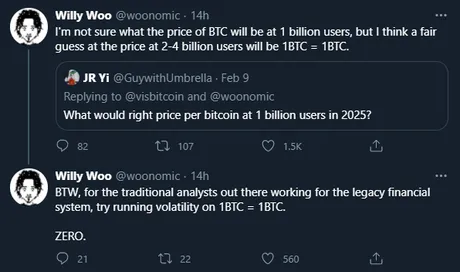
USERS USERS USERS!
I've been seeing a lot of chatter about crypto networks going mainstream and getting those big user numbers. How much value will X platform be worth with Y users?

We see this question pop up right here at home on Hive/LEO as well all the time. Just hours ago @khaleelkazi made an update on the LEOinfra system:
LeoInfra Onboarding Report and Dev Updates
The goal is not to onboard 10 million ghost accounts. Our aim is to onboard 1 million real people to this blockchain and LeoInfra is the path to doing so. Our focus over the coming months with new updates to LeoFinance.io will introduce more dynamics for making it easier than ever to use the site with additions like tooltips, etc.
Of course we want active users, and Lite accounts are helping to forge that reality by increasing retention rates and lowering the barriers to entry. All good things, but this obsession with market cap and users is an obsession with extremely flawed metrics of representation.

Web 3.0 does not farm users like Web 2.0 does.
This is where it all comes from: Web 2.0. Social media sites farm user data. So of course this metric of how many users the network has is extremely important. Again, this is a numbers game, one user is one user. There isn't any wiggle room for users to become more valuable than they already are because all those gains are immediately syphoned into the corporate pyramid.
However, with crypto, everything changes.
Twitter users have no incentive to make Twitter better. The same goes for Facebook and every other centralized social media company. Meanwhile, Crypto Users can bring value to the network in a myriad of ways that the legacy economy could only dream of. As users learn the ropes around here they become more and more valuable, and devs are EXTREMELY valuable, as devs can lower the barrier of entry for everyone else by streamlining simpler systems that anyone can interact with.
So this whole concept of comparing users to other social media sites and platforms is largely flawed. The quality of our users can easily end up having x100 the value of a normal Web 2.0 user. This is the power of the cooperative economy and synergy. And this is also what we want because scaling up is not a simple task. Our users need to be better because we will end up having less no matter how this all goes down in the end.
Example.
Imagine a game that builds itself. The core dev team is small, the backend mechanics of the game are largely basic. Using crypto, we can monetize the game to develop its own frontend. The core dev team does not have graphics designers, because enthusiast graphics designers are building out the game themselves and claiming ownership over the work that they've done using the provable ownership mechanics of crypto.
Taking a game like World of Warcraft for example (MMORPG) the amount of work that goes into such a thing is massive and ever expanding. The world itself needs to be built. Zones to run around in, dungeons to explore and pillage. Graphics for everything. Farming mechanics and everything else.
Most of this work can be outsourced to the community itself. Blizzard Entertainment already takes their community very seriously and employs many of the ideas presented in the forums of the diehard fans of the game. Crypto is about to take that energy and bring it to an entirely new level: monetizing the community itself and exponentially increasing the value of every user within the system.
And this is just one example for one niche application. Hive is not a social media app. Hive is a blockchain that can store any text information, while at the same time being able to store raw Javascript code that can be executed with very little effort. The possible applications here are boundless.
The reason this new technology has so much value is that we know for a 100% fact that all of the information on it is protected by private key encryption, and the owners of those keys has a financial incentive to keep them safe. None of these things would be possible if a centralized authority had access to manipulate the database: immutability and security are key.
But not only does everyone on the network have a financial incentive to protect their private keys: but they also have a financial incentive to bring as much value to the network as they can. You can't get that kind of synergy on Web 2.0: not even close. Big Tech can try to replicate what's being done here until the cows come home. It doesn't matter how much money they pump into it. As Vitalik would say: some projects have a soul, and some don't.
Hive has a soul.
And despite all the adversity we've faced over the years and even in the face of complete annihilation, we stood up and showed the world that life is still tinkering around over here. This story is just beginning.
Conclusion
So yeah, of course we want more users, but be careful what you wish for. Something tells me that our next live stress test is going to be just as ugly as it was in 2017. No one said scaling was easy.
But most importantly: Hive & LEO users are simply more valuable than Web 2.0 users, and I think a lot of crypto speculators out there are ignoring these simple facts. When users have massive incentive to make their network great, great things end up happening for the network. The synergy is real.
Posted Using LeoFinance Beta
Return from User Quality Over Quantity to edicted's Web3 Blog
